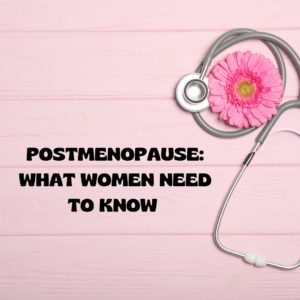
Perimenopausal women look forward to that 12 month anniversary of no periods as the final step to menopause. However, that is not the end. What does that one year mark really mean and why is it important? What will happen to our bodies for the next 30 or 40 years?
Let’s start at the end of perimenopause. You celebrate menopause on the final day of 12 month of no periods. Why is the 12 month mark considered the magic number? Doctors mark that date because if a woman experiences vaginal bleeding post 12 months, it may indicate a more serious issue than menopause. Dr. Sharon Malone, women’s health expert (30+ as an OBGYN) and chief medical officer of Alloy, notes that bleeding after menopause needs to be watched closely. This could be a symptom of something simple such as benign uterine polyps but in a small percentage of midlife women, postmenopausal bleeding may be a sign of certain cancers such as uterine or endometrial cancer.
Research from the Cleveland Clinic notes that approximately 10% of women over 55 experience vaginal bleeding. Causes range from endometrial or vaginal atrophy (thinning of the lining), HRTs, uterine or endometrial cancer, endometrial hyperplasia (uterine lining gets too thick and can contain abnormal cells) and uterine polyps. More rare causes may be cervical cancer, cervicitis (infection or inflammation in the cervix or uterus) or bleeding from other areas close by such as the bladder or rectum. Once your doctor evaluates and diagnoses the issue, treatment options may range from antibiotics to surgery.
What else can postmenopausal women expect? Let’s start with some good news. Dr. Malone explains that some perimenopausal symptoms such as brain fog, mood disturbances, and hot flashes may start to improve once you’ve entered menopause. Improvement may be gradual over several years or further treatment may be helpful to alleviate the symptoms.
It is important for postmenopausal women to know that the decrease in estrogen may affect many systems throughout your body. Those include:
- Cardiovascular Health: According to the American Heart Association: “Older people in general are more likely to have heart disease. Your odds will increase after menopause. The research still isn’t clear, but changes in your hormones and metabolic profiles may explain why older women are more likely to get heart disease. Your metabolic profile includes your blood sugar (glucose) levels, electrolytes, and liver and kidney function. During menopause: estrogen levels go down, blood pressure rises, bad cholesterol (LDL) increases, and good cholesterol (HDL) goes down or stays at the same levels. Triglycerides—fats in your blood that can increase your risk for stroke—also go up.”
- Osteoporosis; There is a correlation between lack of estrogen and bone loss. There are ways to lower your chances of developing Osteoporosis including weight bearing exercises, stop smoking, less alcohol, healthy diet (including Vitamin D and Calcium) and HRTs. Request a baseline bone density test with your doctor to determine your bone density.
- Urinary system: “Lower levels of estrogen may cause the urethra lining to thin. Also, the pelvic muscles around the urethra may get weaker due to aging or vaginal childbirth.” University of Utah This may mean an increase in incontinence, UTIs, vaginal dryness and vulva changes.
- Sex: Lack of estrogen means thinner vaginal tissue and a dryer vagina for many women. As a result, sex may be more painful. Vaginal atrophy now falls under the term genitourinary syndrome of menopause (a/k/a GSM). The Mayo Clinic lists symptoms of GSM to include:
- Vaginal dryness
- Vaginal burning
- Vaginal discharge
- Genital itching
- Burning with urination
- Urgency with urination
- Frequent urination
- Recurrent urinary tract infections
- Urinary incontinence
- Light bleeding after intercourse
- Discomfort with intercourse
- Decreased vaginal lubrication during sexual activity
- Shortening and tightening of the vaginal canal
There are over the counter treatments such as vaginal moisturizers and water based lubricants that women can try. If those do not alleviate symptoms, The Mayo Clinic suggests asking your doctor about vaginal estrogen creams, vaginal estrogen suppositories, vaginal estrogen rings or tablets. There are also vaginal dilators and vaginal lidocaine that may be used but always check with your doctors before starting any treatments.
- Metabolism: Lack of estrogen may be one factor for weight gain but not the only consideration. Lifestyle changes may also be at play.
Dr. Malone also notes that additional symptoms include skin wrinkling, dryness, and itchiness. She explains that while HRTs can be affective not all women require oral or hormone patch therapy. There are alternatives including topical estrogen but that must be used on a consistent basis to see proper results. If you doctor is not answering your questions, you can go to the NAMS website to find a doctor in your area.
While many women celebrate the 12 month mark of our menopausal journey, it is important to note that it IS a journey. We have decades ahead of us and the lack of estrogen needs to factor into our health considerations. It is important to talk to your healthcare provider about your symptoms, concerns and what you can do to maintain a healthy lifestyle.
You can listen to the full episode with Dr. Malone on postmenopause with this link:
Research:
POSTMENOPAUSE: University of Utah
Mayo Clinic: Vaginal Atrophy: Symptoms